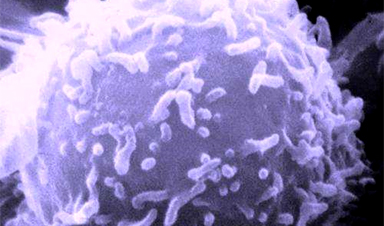Most tumors contain regions of low oxygen concentration where cancer therapies based on the action of reactive oxygen species are ineffective. Now, American scientists have developed a hybrid nanomaterial that releases a free-radical-generating prodrug inside tumor cells upon thermal activation. As they report in the journal Angewandte Chemie, the free radicals destroy the cell components even in oxygen-depleted conditions, causing apoptosis. Delivery, release, and action of the hybrid material can be precisely controlled.
Many well-established cancer treatment schemes are based on the generation of reactive oxygen species (ROS), which induce apoptosis for the tumor cells. However, this mechanism only works in the presence of oxygen, and hypoxic (oxygen-depleted) regions in the tumor tissue often survive the ROS-based treatment. Therefore, Younan Xia at the Georgia Institute of Technology and Emory University, Atlanta, USA, and his team have developed a strategy to deliver and release a radical-generating prodrug that, upon activation, damages cells by a ROS-type radical mechanism, but without the need for oxygen.
The authors explained that they had to turn to the field of polymerization chemistry to find a compound that produces enough radicals. There, the azo compound AIPH is a well-known polymerization initiator. In medicinal applications, it generates free alkyl radicals that cause DNA damage and lipid and protein peroxidation in cells even under hypoxic conditions. However, the AIPH must be safely delivered to the cells in the tissue. Thus, the scientists used nanocages, the cavities of which were filled with lauric acid, a so-called phase-change material (PCM) that can serve as a carrier for AIPH. Once inside the target tissue, irradiation by a near-infrared laser heats up the nanocages, causing the PCM to melt and triggering the release and decomposition of AIPH.
Image Credit: Triche National Cancer Institute
News This Week
Nano-Enhanced Hydrogel Strategies for Cartilage Repair
A recent article in Engineering describes the development of a protein-based nanocomposite hydrogel designed to deliver two therapeutic agents—dexamethasone (Dex) and kartogenin (KGN)—to support cartilage repair. The hydrogel is engineered to modulate immune responses and promote [...]
New Cancer Drug Blocks Tumors Without Debilitating Side Effects
A new drug targets RAS-PI3Kα pathways without harmful side effects. It was developed using high-performance computing and AI. A new cancer drug candidate, developed through a collaboration between Lawrence Livermore National Laboratory (LLNL), BridgeBio Oncology [...]
Scientists Are Pretty Close to Replicating the First Thing That Ever Lived
For 400 million years, a leading hypothesis claims, Earth was an “RNA World,” meaning that life must’ve first replicated from RNA before the arrival of proteins and DNA. Unfortunately, scientists have failed to find [...]
Why ‘Peniaphobia’ Is Exploding Among Young People (And Why We Should Be Concerned)
An insidious illness is taking hold among a growing proportion of young people. Little known to the general public, peniaphobia—the fear of becoming poor—is gaining ground among teens and young adults. Discover the causes [...]
Team finds flawed data in recent study relevant to coronavirus antiviral development
The COVID pandemic illustrated how urgently we need antiviral medications capable of treating coronavirus infections. To aid this effort, researchers quickly homed in on part of SARS-CoV-2's molecular structure known as the NiRAN domain—an [...]
Drug-Coated Neural Implants Reduce Immune Rejection
Summary: A new study shows that coating neural prosthetic implants with the anti-inflammatory drug dexamethasone helps reduce the body’s immune response and scar tissue formation. This strategy enhances the long-term performance and stability of electrodes [...]
Scientists discover cancer-fighting bacteria that ‘soak up’ forever chemicals in the body
A family of healthy bacteria may help 'soak up' toxic forever chemicals in the body, warding off their cancerous effects. Forever chemicals, also known as PFAS (per- and polyfluoroalkyl substances), are toxic chemicals that [...]
Johns Hopkins Researchers Uncover a New Way To Kill Cancer Cells
A new study reveals that blocking ribosomal RNA production rewires cancer cell behavior and could help treat genetically unstable tumors. Researchers at the Johns Hopkins Kimmel Cancer Center and the Department of Radiation Oncology and Molecular [...]














Leave A Comment